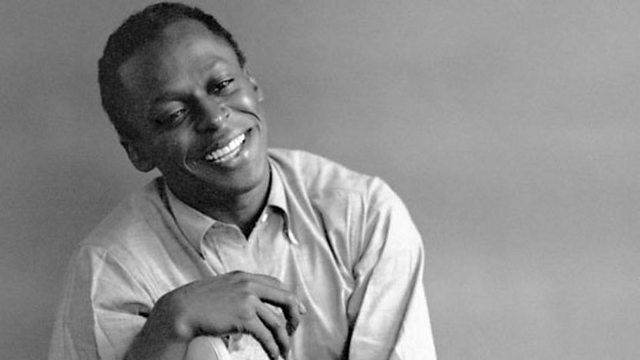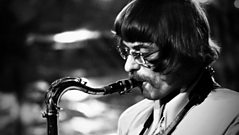Jazz Library - Miles Davis
Teo Macero, famed producer of Miles Davis, selects highlights of his recorded catalogue.
In an exclusive interview, composer, saxophonist and famed producer Teo Macero, who died in February 2008, talks to Alyn Shipton and selects highlights of his recorded catalogue. As well as considering Macero's own recordings as an instrumentalist, including work with Charles Mingus, the programme focuses on his two decades as Miles Davis's producer and on such notable examples of their collaboration as Porgy and Bess, Sketches of Spain, Bitches Brew, and In a Silent Way.
Jazz Top 100 Bio
Miles Davis
(1929 - 1991)
The single most dominating figure in jazz for the second half of the 20th century, Davis influenced virtually every aspect of the music from bebop to cool jazz, from modal improvisations to free jazz, from funk and rock fusions to the dawn of the jazz-meets-world-music revolution.
He is regarded as the heir to the trumpet tradition pioneered by Louis Armstrong and Dizzy Gillespie, and his style is characterised by a clear-toned beauty on his open horn, and the delicate shading of the Harmon mute which produces a pinched, nasal and immediately identifiable timbre.
Davis began playing in and around St Louis, and came to New York to study at the Juilliard School, which he soon abandoned in favour of playing on 52nd Street with Charlie Parker, replacing Gillespie as the saxophonist's trumpet partner. He worked regularly with Parker from 1945-8, apart from Parker's spell in drug rehab during 1946-7.
Davis's first great album was Birth of the Cool recorded by his nonet in 1949-50, with arranger Gil Evans and a number of other great talents including saxophonists Gerry Mulligan and Lee Konitz, trombonist J. J. Johnson and pianist John Lewis. Davis's own drug problems blighted his early 1950s work although he made some fine discs with Sonny Rollins and Horace Silver in his line-ups.
In 1955 he formed a new quintet with John Coltrane on tenor that became one of the leading bands of the 1950s. He was reunited with Gil Evans in a series of discs including Porgy and Bess and Sketches of Spain that pitted Davis's solo trumpet against a large jazz orchestra.
In 1959, with a sextet that included Coltrane, Cannonball Adderley and pianist Bill Evans, Davis recorded what is thought to be the most popular jazz record of all time, Kind of Blue, which uses modal improvisation.
In the 1960s he formed a new quintet with Wayne Shorter, Herbie Hancock, Ron Carter and Tony Williams that set the standard for the decade's small group jazz, and it drew him towards a freer approach to rhythm and his first experiments with rock beats. In the late 1960s with new bandmembers Chick Corea Keith Jarrett, Dave Holland and Jack DeJohnette, he moved into a period of further experiment with free jazz and fusion including the discs In A Silent Way and Bitches Brew.
After a time away from the public eye in the late 1970s, he returned in the 1980s to lead a series of fusion bands, and to make a sequence of highly successful and popular albums starting with We Want Miles. He played right through the summer of 1991 at various international events, including - for virtually the only time in his career - reunions with members of his former bands, as well as a Montreux concert of his Gil Evans collaborations.
Further Reading:
Miles Davis (with Quincy Troupe) Miles - The Autobiography (London, Macmillan) 1989
Ian Carr: Miles Davis - The Definitive Biography (London, Harper Collins) 1998
Recommended CD:
Kind of Blue (Columbia CK 64935)
Suggested Track: All Blues
This is the podcast version of the original programme with music lengths adjusted for archive rights. Listen to the programme from this page or follow the links to download and keep the programme as a podcast.
Duration:
Credits
| Role | Contributor |
|---|---|
| Performer | Miles Davis |
This clip is from
More clips from Jazz Library
-
![]()
Jazz Library - Alan Skidmore
Duration: 02:40
-
![]()
Jazz Library - Cuba Special
Duration: 26:00
-
![]()
Jazz Library - Andrew Hill
Duration: 37:45
-
![]()
Jazz Library - Charles Mingus
Duration: 37:42




